What Designers Want You to Know About Running a Fashion Business in 2023
It’s not all red carpets, award shows and fashion week — in fact, it’s rarely ever just that. Running a fashion brand in 2023 takes a lot of resources, from financial to creative to mental. But designers continuously find ways to innovate and forge ahead on their own terms, leading the industry to grow and evolve with them. Ahead, the people behind the labels making it work sound off on what it’s like.
"I remember somebody said, 'It takes 10 years to develop a fashion brand.' We were like, 'That's so silly.' But it's very true."—Sally Lapointe, co-founder and designer, Lapointe
"Messaging is so important. I'm not going to lie, I think a big part of the initial push was being able to say that I was trained by John Galliano. It's not something that comes into an inbox every day. And to have a big retailer like Neiman Marcus support a young designer is something of note — it gives you a bit of stability that helps you be able to grow."—Bach Mai
"We've always been good at looking at our company and asking, 'Where are we now? Is this the right move? Are we ready for this?' Because if we're going to do [something], we want to go in with the mentality of, 'Can we win?' It doesn't mean we're going to win, it just means that we believed in ourselves."—Jonathan Cohen, co-founder and designer, Jonathan Cohen
"We focus on doing what's right for us [versus] what's fitting a trend. You have to make decisions along the way: What's more important, the message getting out or what's going into your bank account? Granted, what's going in your bank account [is important], but what do you need to reinvest into your brand to allow it to grow, to have the message you want?"—Sarah Leff, co-founder, Jonathan Cohen
"You have to be very vocal about your needs. I'm a designer, so I need someone to handle sales. This isn't my wheelhouse. That's why it's so important to be like, 'Okay, this is what I need help with.' I want to create. I don't want to be my accountant, my business manager, my salesperson."—Edvin Thompson, founder and designer, Theophilio
"We hit at this time when people had been in sweatpants for a year and a half, two years, and there was this resurgence in evening wear. Timing is so, so important."—BM
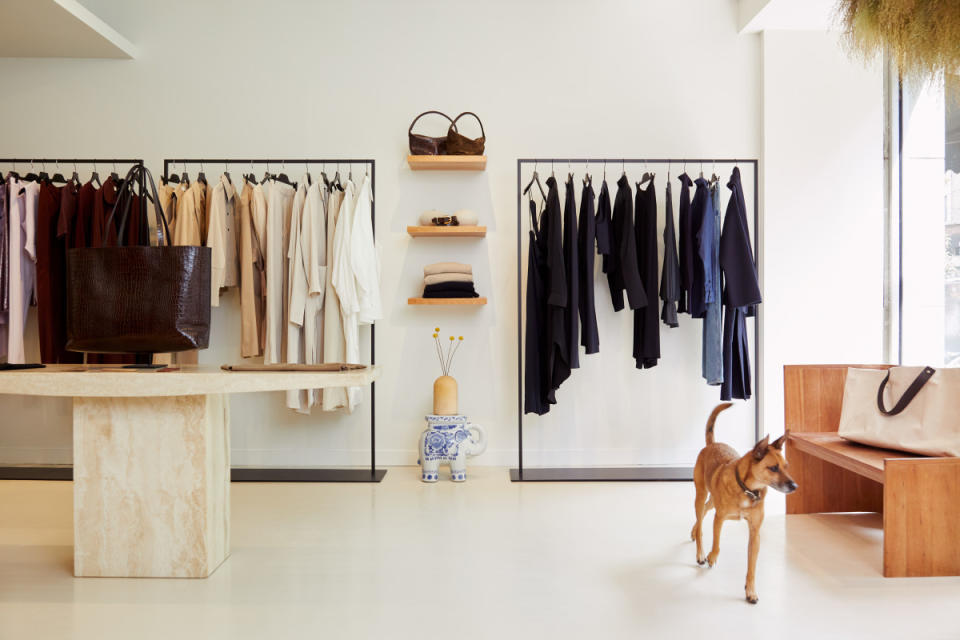
Photo: Courtesy of Kallmeyer
"People can give you advice, but you have to trust what feels right for you, your customers and your capability. A lot of people like to give advice when they're not spending their own money. My favorite thing to say lately, when I have a conversation about rebuilding our website or digital marketing or wholesale and I'm not familiar because I'm not the expert, is, 'What does that mean?' Previously, I might've been too intimidated to say that."—Daniella Kallmeyer, designer and founder, Kallmeyer
"A very important thing we did was never give up on a market, even if it's shown no love. For example, at some point, our China wholesale business was the majority of our revenue — over 80%. It's what kept us alive. But we didn't give up on New York Fashion Week or on doing sales overseas. Things take time. Now, it's flipped: Starting Resort 2022, the China market is less than 5% of our revenue, and the rest of the world is 95%."—Wei Lin, founder, Ph5
"We have participated in a number of CFDA programs, including the Designers Hub with Bethann Hardison, which was really instrumental when we were a younger brand, in exposing ourselves to other designers. To have mentors like Bethann and people that would come on and speak to us just about critical issues was really key. We were able to acquire one of our mentors, Victor Glemaud, through that, and then, Victor set up another organization, called In the Blk. I remember when Virgil [Abloh] was still alive — may rest in peace — he was saying, 'I'm going to open up my contracts for everybody to look at.' Everybody was in the space of being very congenial and welcoming, helping each other. Then, we became CFDA/Vogue Fashion Fund finalists, and that puts you in a lifelong club, which continues to have enormous benefits for us. In L.A., we're in another organization called the Black Design Collective, and they're continually providing mentorship and putting on workshops."—Rebecca Henry, co-founder, House of Aama
"[The CFDA/Vogue Fashion Fund gave us] access. Your Rolodex explodes. When we talk to the kids who are going to be in it, we always tell them, 'You're going to be gaining all these relationships. Make sure you really tap into them and understand, when you're meeting with someone that you really want to meet with, what they can help you with.' It's about being prepared and being able to use those resources after the Fund — not being scared to reach out to them, building that community with other designers and still having that support."—JC
"The most beneficial thing with the Fund was that we were ready. We knew where we needed to grow and what relationships we were searching for and what we had to have answered. The biggest thing is being aware of what's in front of you and how to tackle what's immediately tangible. You can't be one year into a brand and be like, 'How am I taking over LVMH?'"—SL
"You continuously need mentors, to be talking to people about, 'How are you doing this? How are you doing that? Who are you using here? Who are you using there?' We're getting ready to ship to a new retailer, and I'm going to go talk to a colleague tomorrow because they've shipped to them before — so, walk me through it, because it's a new set of requirements. The friendships and the professional relationships that we've acquired in those organizations have just been tremendously beneficial to us."—RH
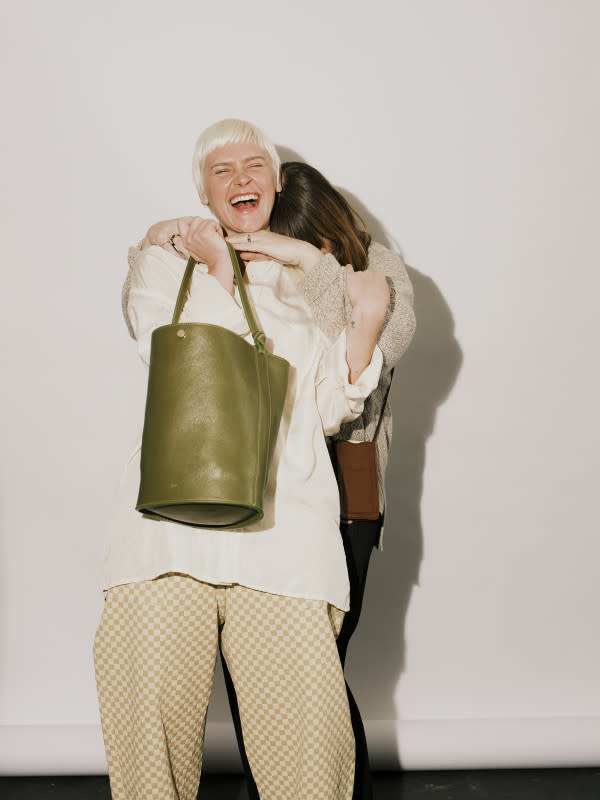
Photo: Courtesy of Lindquist
"Our first season, we received a Visa grant that was hugely beneficial to us. It allowed us to do a lot of the things we wanted, to grow our team, to keep up our production. We bought a new piece of equipment — when you start a new business, you buy things used or secondhand, then slowly over time you get the new one, so we got a new splitting machine [with the grant money]. We do things slowly and evolve naturally, but sometimes, it's really nice to have a little bit of grant money that goes a long way in your small brand. We also looked up stuff through Commerce Rhode Island and the Small Business Association."—Lindy McDonough, founder, Lindquist
"I remember on a Designers Hub call with Bethann, she said, 'You have to stop thinking about yourselves as fashion designers, and you have to know that you're in the apparel business.' That was really key, because when you just think about yourself as a fashion designer, there's a lot of ego. When you understand that you're in the apparel market, that you're making clothing for sale, that takes a mental adjustment, to focus on: Is what I'm making sellable?"—RH
"You have to look at your company and where you're at and [see] if a show makes sense. We had just come out of the Fund and we had a lot of eyeballs on us. We were able to get a lot of partnerships out of it. We never wanted to do that every single season; then the pandemic happened, and that allowed us to rethink those things. There's nothing wrong with a show. For us, I don't think every six months makes sense, both creatively and financially."—JC
"We did a show for Spring 2023 because we received a grant from IMG and the state of New York, where 10 finalists were chosen to receive $50,000 in order to put on a runway as a part of New York Fashion Week, that allowed us to fund it — we became aware of the opportunity and applied for it. We worked with Noah Kozlowski, who was very wonderful in helping us throughout that whole process, and with wonderful producers to make our vision come to life. We had access to resources that we wouldn't have otherwise had access to without that financial support from IMG. That's really a high point of what we've achieved with Interior to date, how emotional and resonant the show was.... The past few seasons, we've not shown in that format, and it's been completely acceptable, as far as the industry is concerned. No one was like, 'Well, why aren't you doing a show again?' Fashion week is a wonderful platform to showcase your brand, and there are many ways to put on a compelling event that doesn't necessarily have to be super expensive."—Jack Miner, co-founder, Interior
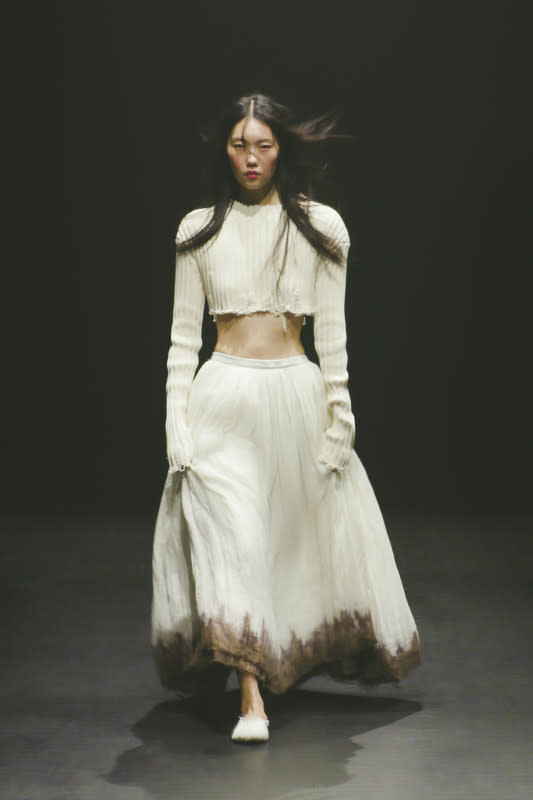
Photo: Launchmetrics Spotlight
"Doing the one [runway] collection gives us breathing room for the wholesale and production cycles. We showed in February; after you show, you're in market, then you're actually producing the collection for five months. There's not really a gap of time where, if you're a small business, you're not doing anything. We decided not to show in September, which essentially is our shipping window and [makes it] feel more impossible to do."—AS
"Fashion week is very helpful, in many ways. It's a platform, and it creates so much excitement and buzz. At the same time, there are a lot of people competing for that excitement and buzz. You have [to find a] balance, especially as a smaller brand, and find your way through the chaos and make an impact… I've always tried to be very smart with our presentations. It's something I've learned a lot from one of my former mentors, who famously did one of the greatest shows of all time on a shoestring budget, this idea that creativity can make up for a lot. Budget helps — you can do a lot of great things with a lot of money. — but it's about staying focused on and tapping into that creativity and not just throwing money at the problem, because we don't have the money to throw at the problem. Our first time showing, we did it off calendar, in my friend's townhouse, in their living room. A few months after, we were on the calendar at New York Fashion Week for the first time, and our presentations have been growing steadily since, from just on mannequins to models the next season. A big part of my being able to get there has been the support of the industry, whether it was our first feature or the CFDA inviting me to be an interim member very early on, that made a huge difference."—BM
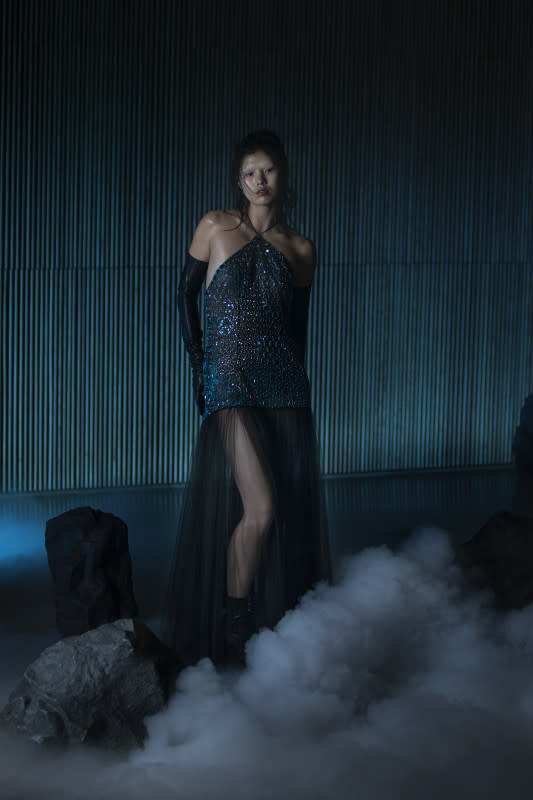
Photo: Amber Gray/Launchmetrics Spotlight
"Even when I did my first show in Brooklyn, in a garage during New York Fashion Week but not on the calendar, I told folks, 'I'm going to be at New York Fashion Week — not officially, but I'm having a fashion show, as a designer.' In 2018, I had the idea of, 'Let's have a fashion show and record it, then we're going to create content out of that.' In 2019, I found this space in Bushwick, a church that had a huge gymnasium underneath, and we created a really amazing foliage situation at the center of the runway. The show was called 'Coming of Age,' and I felt that I was coming of age. I was growing as a designer, stepping into a new space, and I felt my community growing. When Covid happened, we did 'Migration,' our first digital show. Then, our fall collection was filmed at Spring Studios. 'Homecoming' was a fave, 'Air Jamaica' was really, really good. I felt like I was really in sync with my destiny as a creative, as a fashion designer. We had a show, we attended the Met, we won a CFDA Award — it was a really, really, really, really good year. The feeling was just paramount. I felt like, 'Oh, this is success.' But then outside of that, you think about doing market, selling these products, facing small discrepancies with production. It's never going to be perfect, but finding my peace and doing things my way has been my North Star."—ET
"It was a funny time in fashion [when Kallmeyer did its first and only runway show] — a lot about that collection and that show felt like a response to the industry, rather than necessarily what was true to my business. We were only a few seasons in, and we were encouraged to do it as the next step for the business. For a lot of brands, doing your first runway show is the right way to communicate to your audience, especially if your audience is a high-fashion one that looks at the runway for trends or inspiration. That's where there was a disconnect for us, because we were responding to a contemporary wholesale market...That collection was more print-heavy and sportier than we've ever done… We were trying to fit our square peg into a round hole. In a lot of ways, it was a great, exciting collection, and it was an exciting moment for the community. But when I look back, I don't think it was who we were, necessarily. We're now back on the fashion calendar with our first presentation, and we're so grateful to have the CFDA's support in that. We're really excited with the concept that we came up with, because it feels so much more true to what the brand has been since day one and much more in line with the concept that I've been desperate to execute since the beginning."—DK
"Taking the three-year break [from runway] and rethinking, as a smaller brand, how to show, was huge. We found so much success in not doing runway, in showing it in a different way — I had three years of face-to-face with editors, influencers and celebrities that I wouldn't have had had I stuck to runway. The reason I'm excited and doing it [for Spring 2024] is because we're thinking about it a little bit outside of the box, and that only comes with confidence and knowing that it's okay if it's not within a set of rules. Once you get comfortable, that's not a good thing — continuing to push yourself and take those risks [is important]."—SLP
"We weren't on Vogue Runway until five years into our business. We stayed to our own course and knew we would just have to work our way and eventually get there. I grew up loving these magazines, so I wanted it, but I also understood: in good time. We never felt entitled, that this belonged to us. When we did get it, it really did help our business. A lot of stores came to us, and for partnerships, all of a sudden it was like, 'Okay, you have this press, we can work with you because we will get something out of it as well.' Also, for building your community, there are more eyeballs on [the brand] and you start meeting people through that."—JC
"I attended my first Met [Gala], and the day after, I found out I was nominated for a CFDA Award. Prior to that, I was part of the Teen Vogue Generation Next Class of 2020. That notoriety within the fashion space, I don't take that for granted. I was like, 'Okay, you're recognized by the gates of fashion for North America. They admire the work that you do.' I'm working very, very diligently, and I'm definitely wearing it as a badge of honor, but I think it's very important to rise to the occasion, if you will. Even when I did receive the CFDA Award, I was like, 'Wow, what I'm doing, this has immense, immense responsibility. I can't fuck it up.' I was getting awarded, but I had under a hundred dollars in my bank account. It's a very odd perspective. My brand was able to get connected with a lot of people — I can be one text away from someone consulting me on what to do with a contract or a partnership. I'm so fortunate enough to have those mentors that I can call on now. The next step is: How do I activate that resource?"—ET
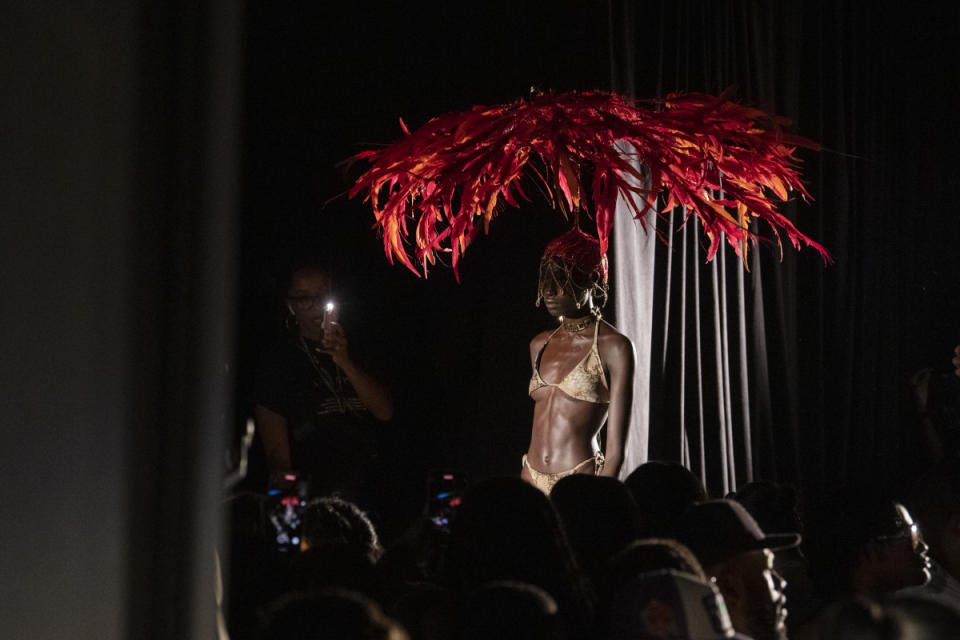
Photo: Launchmetrics Spotlight
"Identify what works best for you. We know specific categories that are our bread and butter, and we also have categories that are an aspirational component, that tell the story. We can have 52 dresses and maybe two winter coats, but the coats are part of the big picture of what the season's about. They're not going to be the same units or the same margins as the dresses. It's about figuring out what we need to do to tell our story and how that works for our brand."—SL
"I remember reading a McKinsey and Business of Fashion report that indicated that storytelling was a continuing trend being amplified in the fashion space. It gives me hope that the angle that we've chosen to take with our brand storytelling, filling in the white space in Americana fashion and focusing on these Black experiences, will continue to [keep people] interested."—RH
"People ask me all the time, 'What changed? You're killing it. You're blowing up. What did you do?' I brought it back to myself. I brought it back to a really true place of authenticity, a place that really came from me. If you let your creativity and your work resonate from the inside out, it's a lot harder to let outside influences debilitate your ability to be successful."—DK
"You definitely have to go with your gut with a lot of things. There's only so much that you can do at certain times. As long as you trust yourself, you're like, 'We're going to get there.'"—LMcD
Read more: How Designers Make It Work in 2023
Want the latest fashion industry news first? Sign up for our daily newsletter.

